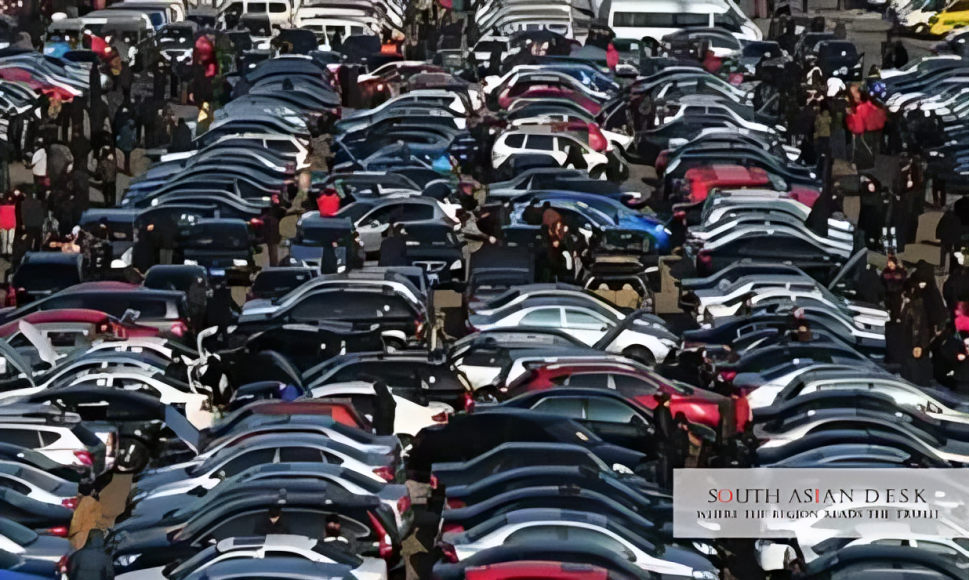International firm’s withdrawals from Pakistan intensify amid policy disputes, raising fears for economic stability.
The Pakistan Automotive Manufacturers Association (PAMA) has issued a stark warning of PAMA uncertainty 2025, attributing it to the newly enacted Motor Vehicle Development Act 2025, which has prompted Yamaha Motor Pakistan to cease operations and signals broader international firms exit Pakistan 2025 trends.
Why it Matters
In a region where foreign direct investment drives industrial growth, the PAMA uncertainty 2025 threatens to erode Pakistan’s appeal as a manufacturing hub in South Asia. With the auto sector contributing significantly to employment and exports, these developments could ripple across neighbouring economies reliant on regional supply chains, exacerbating economic vulnerabilities amid global slowdowns.
PAMA Uncertainty 2025 Looms Over Auto Sector
The PAMA uncertainty 2025 stems directly from the Motor Vehicle Development Act 2025, passed by a National Assembly panel on Monday, September 9, 2025, despite fierce opposition from industry stakeholders. The legislation, aimed at enforcing 57 new international vehicle safety standards starting October 2025, grants sweeping powers to the Engineering Development Board (EDB) and introduces criminal penalties for non-compliance, including potential arrests by the Federal Investigation Agency (FIA).
Abdul Waheed Khan, Director General of PAMA, described the act as “detached from ground realities” in a statement to the Ministry of Industries and Production. He highlighted how it criminalises routine business matters, such as administrative oversights in safety compliance, which could lead to long prison sentences. “Treating civil issues under criminal law, with the possibility of arrests and long sentences, is catastrophic for foreign investors,” Khan stated.
PAMA, representing major assemblers in Karachi and beyond, argued that the act was drafted without industry consultation and overlaps with existing frameworks like the Auto Policy 2021-26. The association urged the Ministry to suspend implementation for scrutiny, warning that it ignores broader safety concerns such as road infrastructure and enforcement. This PAMA uncertainty 2025 has already deterred potential investments, with foreign direct investment in the sector remaining negligible despite earlier incentives.
The act’s focus on vehicle safety, while aligning with global norms, fails to address unorganised market players, potentially favouring informal operators over documented businesses. PAMA submitted formal objections during a September 5, 2025, meeting chaired by the Additional Secretary of Industries, but the bill advanced amid an IMF structural benchmark requirement for regulatory reforms.
International Firms Exit Pakistan 2025 Accelerates with Yamaha’s Departure
The international firms exit Pakistan 2025 gained momentum with Yamaha Motor Pakistan’s announcement on Monday, September 9, 2025, to discontinue motorcycle manufacturing. The Japanese firm, which re-entered the market in 2015 with a $100 million investment, cited a “change in our business policy” in an official filing signed by Managing Director Shinsuke Yamaura.
Yamaha’s exit marks the end of a decade-long effort that included localising engine production, transferring technology, and creating thousands of jobs. Despite achieving localisation targets and contributing to the sector’s growth, the firm could not sustain operations under mounting pressures. PAMA linked the departure directly to the PAMA uncertainty 2025, calling the export mandates for raw material imports tied to the new act “the last nail in the coffin for an already struggling auto sector.”
Indus Motor Company (IMC), a key player, reported subdued sales in fiscal year 2025, with 223,799 units sold, short of projections due to flood disruptions. Without such setbacks, the market could have surpassed 300,000 units in fiscal year 2026, underscoring the fragility exacerbated by policy shifts.
This is not an isolated case in the international firms exit Pakistan 2025 wave. Earlier departures include Shell, Uber, Careem, Microsoft, and Telenor, all of which scaled back or fully exited citing regulatory hurdles and economic instability. PAMA’s Khan noted that these exits reflect a pattern of “regressive and exploitative” policies that undermine investor confidence, potentially accelerating further international firms exit Pakistan 2025 if unaddressed.
Broader Implications for the Auto Industry
The PAMA uncertainty 2025 extends beyond immediate exits, threatening the entire value chain. The auto sector, a bellwether for manufacturing, employs over 500,000 directly and supports ancillary industries like steel and plastics. With sales volumes stagnant and imports restricted under the new act, local assemblers face squeezed margins and reduced competitiveness.
Data from PAMA indicates that while the industry met localisation goals under the 2016-21 policy, the 2021-26 framework’s ambitious export targets, now enforced criminally have backfired. International firms exit Pakistan 2025 could lead to a $500 million shortfall in planned investments, per industry estimates, hampering technology upgrades and job creation.
Stakeholders fear the act’s FIA involvement equates industrialists with “hardened criminals,” as Khan put it in his letter to the Federal Secretary. This has prompted calls for provincial consultations, absent in the drafting process, to balance federal oversight with regional needs.
Background
Pakistan’s auto industry has navigated volatility since the 1950s, with peaks in the 2000s driven by liberalisation. The 2016 Auto Policy spurred $1 billion in FDI, but inconsistent enforcement and currency fluctuations eroded gains. The Motor Vehicle Development Act 2025, intended as an IMF-mandated reform, instead amplifies PAMA uncertainty 2025 by prioritising penalties over incentives.
What’s Next
As the act takes effect in October 2025, industry leaders anticipate legal challenges and investor pullbacks. PAMA uncertainty 2025 may persist unless the government revises contentious provisions, potentially stabilising the sector and curbing further international firms exit Pakistan 2025.
In the face of this PAMA uncertainty 2025, Pakistan’s auto manufacturers brace for a pivotal year that could redefine regional investment flows.
Published in SouthAsianDesk, September 19th, 2025
Follow SouthAsianDesk on X, Instagram, and Facebook for insights on business and current affairs from across South Asia.






